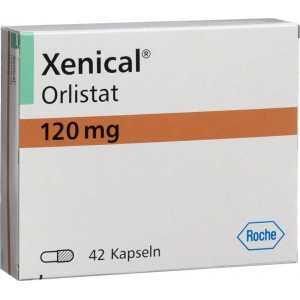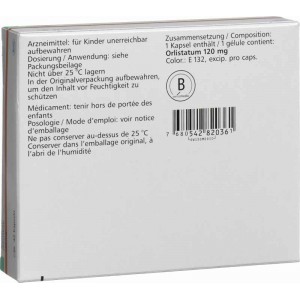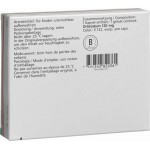Shipped From: France
Shipping Method: La Poste (Trackable)
Delivery Time: 7 To 12 Days
Availability:
Buy Xenical online Best quality Pills at cheapest price
What is Xenical and when is it used?
Xenical is used in conjunction with a slightly reduced calorie diet for the treatment of adult obese patients with a body mass index (BMI) of ≥30 kg / m² or of adult overweight patients (BMI ≥28 kg / m²) with accompanying Risk factors such as type 2 diabetes, increased blood lipid levels, or high blood pressure appear.
Xenical is intended for the treatment of patients aged 12 years and over. Xenical should only be used in adolescents if the BMI value is above the age-specific value in the table below (BMI value (kg / m 2 ) = body weight in kg divided by body length in square meters).
|
Age (years) |
BMI male |
BMI female |
|
12th |
26.02 |
26.67 |
|
12.5 |
26.43 |
27.24 |
|
13 |
26.84 |
27.76 |
|
13.5 |
27.25 |
28.20 |
|
14th |
27.63 |
28.57 |
|
14.5 |
27.98 |
28.87 |
|
15th |
28.30 |
29.11 |
|
15.5 |
28.60 |
29.29 |
|
16 |
28.88 |
29.43 |
|
16.5 |
29.14 |
29.56 |
|
17th |
29.41 |
29.69 |
|
17.5 |
29.70 |
29.84 |
Treatment with Xenical is indicated for patients who are diet-related overweight and who have not responded adequately to suitable weight-reducing measures. In adolescents, therapy should be considered especially if obesity complications exist.
Xenical affects the digestion of dietary fats, but does not curb appetite.
Dietary fats are chemical compounds that have to be broken down by enzymes called lipases before they can be absorbed by the body. When Xenical is taken with a meal, it inhibits the activity of these enzymes. As a result, about 30% of the fats in the diet pass undigested through the gastrointestinal tract. The body can neither store these excess calories in adipose tissue nor use them for energy production. This promotes weight loss.
The weight loss achieved with Xenical can lead to an improvement in diseases related to obesity such as type 2 diabetes, high blood pressure, increased blood lipid levels.
Xenical should only be taken on prescription from a doctor.
What precautions should be taken?
To get the most benefit from Xenical, you should follow the nutritional regimen recommended by your health care professional. As with many other nutritional programs, excess fat and calorie intake can prevent any weight loss.
When should Xenical not be taken?
Do not take Xenical if you are hypersensitive to orlistat or any of the other ingredients.
You should also not use Xenical if your doctor has diagnosed you with a reduced intake of essential food components.
Also, if you have liver disease, you should not take Xenical.
You should not take Xenical if you are pregnant or planning to become pregnant.
You should not breast-feed during treatment with Xenical as it is not known whether Xenical is excreted in breast milk.
Xenical is not intended for the treatment of children under 12 years of age.
When should caution be required when taking Xenical?
Before starting treatment with Xenical, tell your doctor or health care professional if you suffer from a decreased intake of essential food components (chronic malabsorption) or if you are allergic to other medicines, foods or dyes.
Weight loss can also affect the dosage of supplements used to treat high cholesterol or diabetes mellitus. You should discuss the use of these or similar medicines with your doctor.
Your weight reduction can lead to the need to adjust the dosage of these preparations.
Xenical reduces the effects of cyclosporine, a medicine used to treat transplant rejection. The use of Xenical in transplant patients requires special precautionary measures.
The use of orlistat may be associated with kidney stones in patients with chronic kidney disease. Tell your doctor if you have kidney problems. Xenical can also change the effects of anticoagulants (anticoagulants) and amiodarone (antiarrhythmic). Your doctor will monitor you and, if you are taking anticoagulants, have your INR values (Quick values) measured regularly.
Xenical can change the effects of iodine salts and/or levothyroxine (thyroid hormone). Rarely, hypothyroidism (lack of thyroid hormone) and/or decreased control of hypothyroidism may occur.
Xenical can also change the way some HIV medicines work. If you are taking amiodarone (for cardiac arrhythmias) at the same time, ask your doctor for advice.
Xenical can affect the way some drugs from the benzodiazepine group work (for depression, psychiatric disorders or anxiety).
Caution should also be exercised when concomitantly treated with anti-epileptic drugs. If you notice a change in the frequency and/or severity of the seizures, contact your doctor immediately.
Xenical can cause changes in bowel habits. Excretion of undigested fat can lead to greasy or oily stools. Since taking Xenical with a particularly high-fat meal increases the possibility of these side effects occurring, your daily fat intake should be divided evenly over three main meals.
The irregularity of the stool can impair the effectiveness of oral contraception. Therefore, especially if diarrhea occurs, an additional method of contraception should be used.
Xenical can reduce the absorption of some fat-soluble food components, especially beta-carotene, vitamin D, vitamin E, and vitamin K. You should therefore follow the advice of your doctor and maintain a balanced diet rich in fruits and vegetables.
Your doctor should decide whether to prescribe a multivitamin for you to ensure that your vitamin levels remain within the normal range during treatment with Xenical.
Adolescents should take a multivitamin preparation daily during treatment with Xenical in order to prevent vitamin deficiency during puberty and extended growth phases. Medical monitoring should be carried out after the start of therapy, after 6 weeks, and then at three-month intervals. Weight loss should be monitored as massive weight loss during puberty can negatively affect growth.
Inform your doctor or pharmacist if you suffer from other illnesses, have allergies or are taking other medicines (including those you have bought yourself!)!
Can Xenical be taken during pregnancy or while breastfeeding?
Xenical should not be used if you are pregnant or trying to become pregnant.
It is unknown whether Xenical is excreted in breast milk, therefore breastfeeding should not be carried out during therapy with Xenical.
Xenical must be taken as directed by your doctor.
The recommended dose of Xenical is one 120 mg capsule with each main meal. It can be taken before, during, or up to 1 hour after a meal. Take the capsule with water.
Xenical should be used in conjunction with a balanced, slightly reduced-calorie diet that is rich in fruits and vegetables, and that contains approximately 30% of the calories as fat. The daily intake of fat, carbohydrates, and protein should be divided into three main meals. This means that you usually take one capsule with breakfast, one capsule with lunch, and one capsule with dinner. For best results, avoid high-fat foods such as biscuits, chocolate and snacks between meals.
You can stop taking Xenical if you skip the main meal or if you eat a meal that does not contain fat.
Tell your doctor if for any reason you have not taken the preparation as prescribed. Otherwise, your doctor could make unnecessary changes to the treatment based on the assumption that it will not work or that it is poorly tolerated.
If you do not have diabetes mellitus, your doctor will stop treatment with Xenical after 12 weeks if you have not lost at least 5% of your body weight since starting treatment with Xenical. The safety and effectiveness of Xenical have been proven in long-term studies. Xenical can be taken for up to 4 years.
In adolescents, treatment should only be carried out with accompanying controls of the vitamin level and as part of a care program. The duration of therapy should be limited to 1 year.
When taking a multivitamin preparation, there should be an interval of two hours between Xenical and the multivitamin preparation.
Tell your doctor or pharmacist immediately if you have taken more capsules than you were prescribed, or if someone else accidentally takes your medicine. Do not take forgotten capsules in addition.
Do not change the prescribed dosage on your own. If you think that the medicine is too weak or too strong, talk to your doctor or pharmacist.
What side effects can Xenical have?
The majority of Xenical's undesirable effects occur as a result of its local action in the gastrointestinal tract.
The following side effects may occur when taking or using Xenical:
Increased bowel movements, urge to defecate, flatulence, winds with bowel movements, oily secretions, thin, oily or greasy stools, fecal incontinence, pain / discomfort in the lower abdomen and rectum, fatigue and headaches can occur.
These symptoms occur at the start of treatment, are temporary, and are especially seen after high-fat meals.
Usually, these symptoms go away with the continuation of therapy and following the recommended diet.
In rare cases, hypersensitivity reactions can occur, which are mainly expressed in the form of itching, reddening of the skin, edema and hives, but also severe shortness of breath, nausea, vomiting and malaise.
Very rare cases of blistering rashes and increases in liver function tests have been reported. Individual cases of sometimes severe liver inflammation (hepatitis) have been observed.
In clinical studies, some type 2 diabetics experienced low blood sugar levels and gas.
Anxiety, lower and upper respiratory tract infections, tooth and gum problems, urinary tract infections and menstrual irregularities were also frequently reported. Cases of increased excretion of oxalic acid (hyperoxaluria) and kidney damage due to stone formation, gallstones and rectal bleeding have also been reported.
If you notice any side effects not described here, or if you do not feel well while taking Xenical, you should tell your doctor or pharmacist.
The medicinal product may only be used up to the date marked "EXP:" on the pack.
The Xenical capsules should not be stored above 25 ° C in the original packaging and protected from light and moisture.
The medicine should be kept out of the reach of children.
Your doctor or pharmacist can provide you with further information. These people have the detailed information for specialists.
Each Xenical capsule contains 120 mg of the active substance orlistat. The capsule



